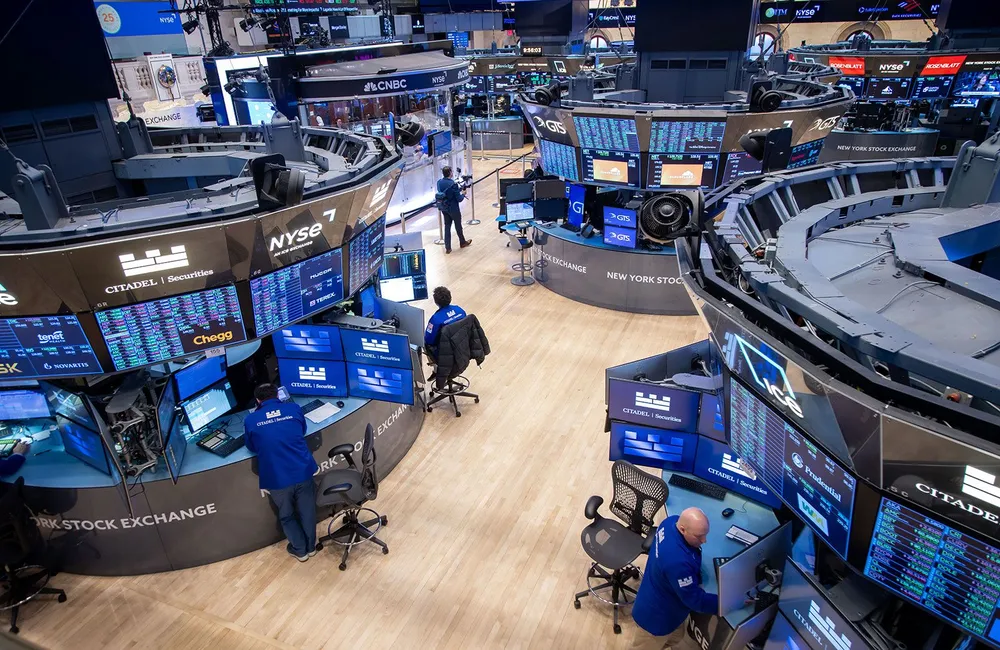At home, fresh inflation figures are set to be released at 11.30am, with a record price surge seen.
ASX futures were 36 down points or 0.5 per cent at 6675 as of 8. on Wednesday, largely signaling a drop at the open.
US stocks had a poor overnight; they only lost more as the day continued. The S&P 500 ended the day down 1.2 percent. The tech-heavy Nasdaq Composite fell 1.9 percent, and the Dow Jones Industrial Average lost 0.7 percent.
The major indexes are hanging onto slight gains for July, but inflation that won’t let up and signs an economy may be waning aren’t giving investors any reprieve. This week, the busiest of the second-quarter earnings season, also coincides with a Fed policy meeting at which US central bankers are expected to begin the process of tightening their interest-rate policy on Wednesday by lifting borrowing costs by three-quarters of a percentage point to fight rising prices.
With higher borrowing costs starting to suppress economic output, investors are focusing on how strong household finances and corporate profits remain.
“We have been so spoiled over the last couple years that it seemed as if all earnings reports were beating or meeting the mark,” said Wayne Wicker, the chief investment officer at MissionSquare Retirement. “For sure as we’ve entered 2022, we have not seen that.”
In commodities trading, Brent crude slid 0.4% to US$104.70 and gold eased 0.1% to US$1733.90.
Turning locally, the yield on 2 Year Australian government paper is up slightly at 2.67% from yesterday’s settlement while the 10 Year dipped to 3.33% with inflation on the cards for the day ahead. Internationally, the US 2 year strengthened against small, up to 3.05% while the 10 year was higher at 2.81%.
The Australian dollar was at 69.37 US cents, having fallen from 69.53 at the last close. The National The Wall Street Journal Dollar Index, which measures the U.S. currency against 16 others, rose to 98.88.
Asia
Chinese shares ended higher, recovering from earlier losses with help from the property sector. Sentiment on the real-estate sector has improved as hopes for government intervention have grown, with some views that it isn’t likely to be too weak. Poly Developments rose 5.8% and China Vanke gained 3.1%, and Gemdale and China Merchants Shekou Industrial each surged over 8%. Auto makers recouped some losses from the previous session, with Great Wall Motor and BYD Co. up 0.5% and 0.6%, respectively. Pharma stocks were laggards. Jiangsu Hengrui Medicine dropped 6.0 percent and Shanghai Fosun Pharmaceutical fell 3.1 percent. The Shanghai Composite Index gained 0.8% to 3277.44 while the Shenzhen Composite Index advanced 1.0% and the ChiNext Price Index rose 0.3%.
Hong Kong tech and property stocks led gains as the Hang Seng advanced 1.7% to close at 20905.88, further adding to an early rise. Property stocks rallied on reports that China is looking to establish a property relief fund worth as much as $44 billion that would aid troubled developers. Country Garden Holdings rallied 13%, China Resources Land climbed 3.6% and Longfor Group advanced 3.7%. The tech stocks Meituan climbed 1.3 percent, and JD. com gained 1.8%. Alibaba Group gained 4.8 percent after the company announced that it would seek a primary listing in Hong Kong.
The Nikkei Stock Average fell 0.2% to 27655.21 as uncertainty about the economic outlook and business costs weighed on investor sentiment. Shipping stocks declined, as Nippon Yusen dropped 1.9% and Mitsui O.S.K. Lines were down 1.0%. Video Game developer Koei Tecmo lost 3.4% early on after its 1Q net profit fell. W-Scope advanced 16 percent and lifted its 2022 revenue and net profit forecasts after the company that manufactures lithium-ion battery separators raised the estimates. Reports on (FOMC: Federal Open Market Committee) decision later in the week and Japanese corporate earnings could be near-term focus.
Europe
European stocks were mixed after E.U. countries came to a watered-down agreement to cut gas consumption over fears of a shutoff in supplies by Russia and the International Monetary Fund cut its global growth forecasts.
The pan-European Stoxx Europe 600 and London’s FTSE 100 were little changed, but the German DAX slid 0.9% and the French CAC 40 fell 0.4%.
"EU plans to curb gas demand demonstrate the way in which countries are likely to push through measures which threaten to stifle economic activity in the quest to wean themselves off right" IG analyst Joshua Mahony writes. Meantime, the new IMF report emphasizes the twin challenges to the Federal Reserve of higher inflation and slower growth, which it is expected to confront as the central bank starts its two-day meeting today, he notes.
Shares of UBS Group fell 9.4 percent after the bank reported that its second-quarter earnings had ticked up slightly, but were lower than what analysts had expected.
North America
US stock indexes closed down in part because of a mixed batch of earnings reports that seemed to plot an uncertain course forward for markets ahead of a potentially critical Federal Reserve meeting this week.
Stocks opened sharply lower and extended their losses throughout the day. The S&P 500 ended the day down 1.2 percent. The Nasdaq Composite, which was disproportionately tech-laden, fell 1.9%, while the Dow Jones Industrial Average slipped 0.7%.
The major indexes have held onto modest gains for July, but persistent inflation and indications that the economy may be slowing are giving investors no break in which to relax. The busiest week of the second-quarter earnings season also brings a Fed policy meeting, in which the US central bankers are expected Wednesday to lift interest rates by the most since 1994, increasing them 0.75 of a percentage point from the near-zero level they have been since the pandemic hit.
As higher borrowing costs start to take a bite out of economic output, investors are watching to see how well household finances and corporate profits hold up.
“We have been so coddled over the last couple of years, with every earnings report being in line or above,” said Wayne Wicker, the chief investment officer at MissionSquare Retirement. “Certainly as we’ve moved into 2022, it has not been the case.”
Walmart shares declined $10.04, or 7.6 percent, to $121.98 after the largest retailer in the country warned that higher prices for food and fuel were starting to prompt consumers to pull back. Target shares were also dragged lower, falling 3.6 percent, or $5.68, to $151.81. Shares of General Motors slid $1.18, or 3.4 percent, to close at $33.34 after the carmaker reported second-quarter profit that missed estimates.
There were other pockets of good news in the earnings reports. Shares of General Electric rose $3.15, or 4.6 percent, to $71.51 after the company posted stronger-than-expected results. The consumer-product maker 3M rose 4.9 percent, or $6.63, to $140.75 after announcing a pivot that would result in the spinoff of its health care business to form two publicly traded companies.
In the premarket, traders will digest numbers from Bristol-Myers Squibb and Kraft Heinz on Wednesday. They will also respond to big reports that arrived after the close of markets on Tuesday: The sales and earnings of Microsoft fell short of what analysts had expected, and Alphabet reported its weakest quarterly sales growth in two years.
Wall Street is eager for clues about how different corners of industry are holding up against an inflationary environment, rising interest rates and the fact that many consumers are growing sour on the economy. Some of these investors are afraid that the quick tightening of financial conditions will further undermine the economy weighed down by Covid-19, supply-chain disruptions and the Ukraine war and tip the US into recession.
“You could have a much longer period of slower growth,” said Georgina Taylor, a multi asset fund manager at Invesco. “There is much of what’s happening right now that you cannot model.
That leaves stock investors to guess how corporate valuations will rise or sink with the economic tide. A slowing economy might even help equity prices if it causes the Fed to scale back its anti-inflation battle, Kristy Akullian, senior strategist at iShares Investment Strategy said.
“A Fed pause would likely be the signal that a lot of market participants are looking for that they can put their toe back into the equity markets,” she said.
For now, anxiety continued to seep into the bond market, sending the yield on the 10-year Treasury note in Tuesday trading down to 2.786%, compared with 2.819% on Monday. The benchmark government bond has rallied the last month as investors look for a safe harbor and scale back their bets on how high the Fed will drive short-term interest rates before reversing itself. Bond yields tend to fall as bond prices rise.
Debt investors are attempting to discern how the central bank will reconcile its twin jobs: getting inflation under control and avoiding a severe contraction that could threaten the still-healthy labor market. Falling yields suggest that many traders expect the Fed to shift to easier money to help shore up a slowing economy. But they may be underestimating how tenacious inflation has become, according to Thanos Bardas, global co-head of investment-grade debt at Neuberger Berman.
“I’m highly skeptical that the Fed will be able to lower rates as quickly as the market thinks,” Mr. Bardas said.





















